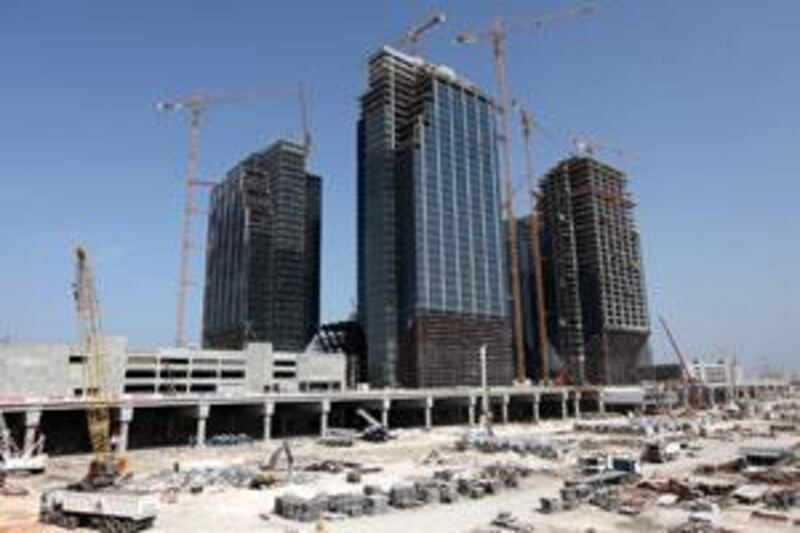Mubadala Development has begun filling its new central business district on Sowwah Island with big corporate names despite the gloomiest property market conditions in the country's history. Abu Dhabi's strategic investment company yesterday announced it had signed a deal with Four Seasons Hotels and Resorts to build a hotel with 200 rooms and 125 hotel apartments next to the central Sowwah Square project on the island. It will join another hotel being built by Rosewood, the US luxury operator, on the other side of Sowwah Square and a planned Viceroy hotel, catering to the boutique business market.
Four Seasons had been planning a hotel in Dubai's Festival City, overlooking Al Badia golf course, but put the project on ice last year. The new hotels will cater to some of the 75,000 professionals expected to work on Sowwah Island, located between the Tourist Club area of Abu Dhabi island and Reem Island. The first office workers are expected on the island in 12 months. Tower 1, the first of four in Sowwah Square, is already "more or less leased out", said John Thomas, the executive director of Mubadala Real Estate and Hospitality during a tour of the site. Tenants include top-tier law and accounting firms, as well as local and international banks and financial services companies.
Some of these tenants will be able to begin fitting out their space by the beginning of next year, for occupancy as early as next April. National Bank of Abu Dhabi and Al Hilal Bank last year bought plots of land to build towers. Despite the tough property market, Sowwah Island will fill a gap in the Abu Dhabi market for high-quality office and living space, industry executives say. The development also benefits from the backing of Mubadala.
"We're patient long-term capital," Mr Thomas said. "We are building here in anticipation of the rising market." Prices may fall further in Abu Dhabi as more units are delivered, having already dropped by half in some cases. But there is also evidence of a "stratification" of the market, where people begin distinguishing more between different qualities of housing and office space. Mubadala's strategy for selling apartments on Sowwah is still under review because of the demise of the off-plan market. One idea is to keep more of the space for rent and manage the projects as yield-generating investments rather than making one-off sales.
"My philosophy is that the demand drivers are still there," Mr Thomas said. "There will be an undersupply for another four or five years." Despite the depressed property and financial sectors, Abu Dhabi will attract more finance companies because such enterprises always move toward centres of growth, said Karim el Solh, the chief executive of Gulf Capital. Mr el Solh's company has a joint venture with Related Companies in the US to develop buildings in Abu Dhabi.
"You'll see all of the investment banks and financial services companies gravitating to where there is liquidity and GDP growth, which is Abu Dhabi," he said. "Abu Dhabi is clearly on the move. It's the logical centre to be in." Mubadala is also close to signing contracts with six property developers "from Asia to the United States" to build towers in the first phase of the island, Mr Thomas said. Hines Interests, which has US$42 billion (Dh154.26bn) worth of properties under management and has built towers around the world, is among those in negotiations, according to people familiar with the situation.
While the Sowwah district draws comparisons to the Dubai International Financial Centre (DIFC), a tax-free zone with its own courts and regulator that has become the heart of business in Dubai, Mr Thomas said that Sowwah had different aspirations.
"This is the place for Abu Dhabi business to converge," Mr Thomas said. "This is not a DIFC model." The 105-hectare Sowwah Island is designed to become a new downtown, rather than a financial centre, he said. There will be a large healthcare component with facilities such as the 9.3ha Cleveland Clinic Abu Dhabi Hospital on the southern end of the island. More than 40 per cent of the island is reserved for residential buildings.
"It's not just about having people here during office hours," Mr Thomas said. "At night, people will come here to eat at one of 25 restaurants. It has to be active all the time." The 25,000 square metres of retail space will be akin to Time Warner Centre in Manhattan, with boutique restaurants and stores, he said. To create the lifestyle of the development, special attention has been paid to infrastructure. The entire project is built on two levels: the lower level is for parking, maintenance and other services, while cars will drive on the upper tier. There will also be air-conditioned walkways.
bhope@thenational.ae






